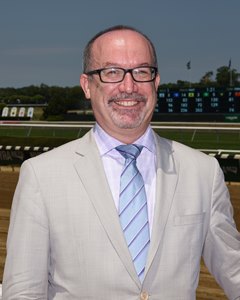Life Without Racing: Andy Serling


There's no doubt the COVID-19 pandemic has changed everyday life across America in so many ways.
Some unimaginable and heartbreaking, others more subtle.
For Andy Serling, the combination of life in isolation to combat the spread of the virus and nearly a month without racing in New York has turned the highly opinionated New York Racing Association analyst/handicapper into a night owl.
Instead of leaving his apartment on the Upper West Side of Manhattan in the morning and heading to Aqueduct Racetrack or Belmont Park, these days, like millions of others in New York City, he only ventures outside occasionally, choosing to make late-night departures from his home to purchase food and other essential items.
"I don't go out too often, except late at night when I get groceries after midnight and I've encountered very few people," Serling said. "I'm laying low."
Normally Serling can be seen throughout the week on NYRA's television or simulcast shows, offering his no-holds-barred commentary and selections that have made him one of the sport's leading personalities and has generated a lively love-hate relationship with fans.
But now, with no racing at Aqueduct since March 15 and logistical issues keeping him from NYRA telecasts of national racing, Sterling no longer spends long hours scrutinizing past performances of New York races.
He can still stir the pot on Twitter like a master chef, but otherwise his days are quiet and subdued, filled with reading, phone calls, binge-watching and some exercise, all within the confines of the four walls of his apartment.
"The only thing I can do professionally is engage people on social media. I'll put up a poll each day and try to come up with a different idea for each day to get people involved. They probably average about 1,000 votes a day. I'll also put up a video that can be related to the poll or from a horse from the past. Racing has such a great history that there's a huge data base of fun stuff," Serling said. "I'm just trying to keep people engaged in racing at a time when there isn't that much going on. I welcome other ideas, but there's not much more that I can do."
Once he checks out from Twitter, Serling has been using his unexpected free time to reacquaint himself with the "Mad Men" series and find out why "The West Wing" was such a hit show some 20 years ago.
"Obviously, I have a job which entails a lot of work in normal situations that takes up a lot of my time, which I like and I'm lucky to have. But now I have a lot of time to fill. I've been watching shows on Netflix. I've watched all of 'Mad Men,' which I watched before but hadn't seen for a while. I'm now watching 'The West Wing,' which I never watched, and it's great," said the former Wall Street stock trader who joined NYRA in 2008. "Like a lot of people, I'm reading and I'm riding my exercise bike so I can get some exercise on occasion. I live alone, so I'll talk to people I work with and there are occasional discussions at NYRA that I am involved in, but I'll also try to stay in touch with friends and talk to my mom a lot ."
As boring as life in isolation can be for someone who is single and lives alone, Serling knows that staying safe and helping to flatten the curve in an epicenter of the virus is vitally important.
"There really isn't much any of us can do outside of doing your part to stay safe like everyone else," Serling said. "It's a situation where you don't want to get antsy and do anything regrettable. I'm encouraged that when I was doing shows at Aqueduct I would drive through the city and would see that the city is empty. People are not going out. When I go out late at night to shop, you don't see people and that's good. Hopefully by people acting responsibly we can stay safer and find a way to reach the end of this sooner rather than later."
Until that time in the future when racing can resume at Belmont Park and everyone in the sport can return to their normal routines, Serling is hopeful that the racing community can come together to help those who need it most.
"We want everyone to be safe and it's a hard time in racing. You don't want to tell people how to donate their money but if there's anything they can do help the backstretch communities, it's a good time to do that," he said. "The racing ecosystem is a pretty fragile one. These are trying times and the sooner we get back to racing, the better. This affects everyone who works at the racetrack. We're all in it together and it's important to do as much as you can to facilitate the situation."
